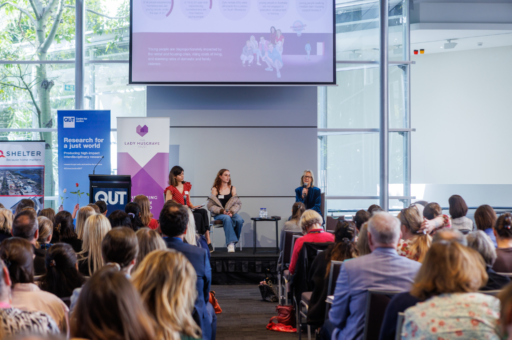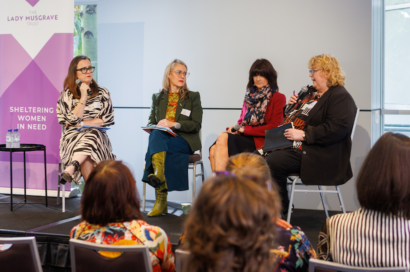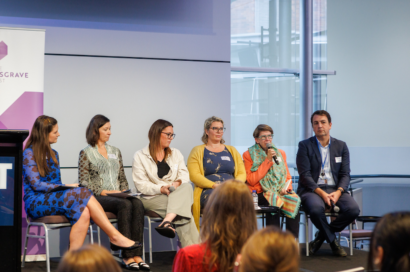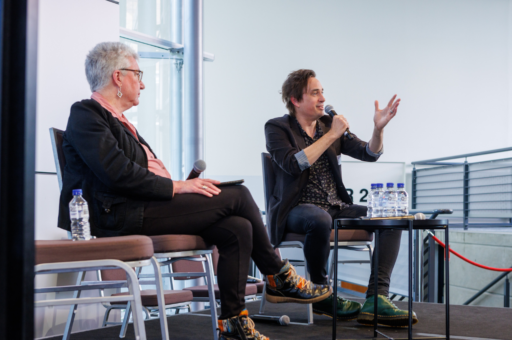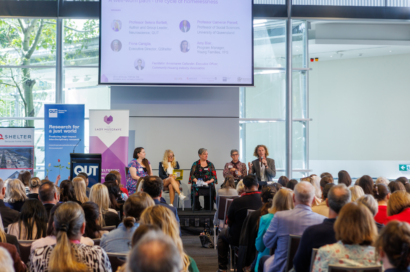
How society perpetuates homelessness – and what we can do to break the cycle
Oct 15, 2024
“Homelessness is a choice of how we organise society.”
These thought-provoking words from Professor Cameron Parsell challenge the idea that homelessness is simply the result of personal failings or a stroke of bad luck. Instead, they expose a deeper, systematic issue rooted in how our society functions – or, more accurately, how it’s built to benefit some while leaving others vulnerable.
At this year’s Annual Forum on Women and Homelessness, a panel of experts – including Parsell, Professor Selena Bartlett, Fiona Caniglia and Amy Blair – came together to discuss the ways our society perpetuates homelessness, from childhood trauma to systematic breakdowns.
Facilitated by Anne Marie Calendar, Executive Officer of the Community Housing Industry Association, the panelists made one thing clear: that solving homelessness requires us to fundamentally rethink our approach to housing and social support systems.
A matter of choice
The University of Queensland’s Professor Cameron Parsell is an Australian Research Council Industry Fellow in partnership with Micah Projects. His work focuses on the nature and experience of poverty, homelessness, and domestic and family violence – and he began the panel by framing homelessness not as an unfortunate result of happenstance, but as a deliberate outcome of how society chooses to function.
It’s an approach that disrupts the widely held belief that homelessness is a result of personal decisions, bad luck, or lack of effort. Instead, Parsell asserts that it is a direct product of structural conditions that benefit some while leaving others behind.
“Housing is a mechanism in society for producing wealth, but that comes at the expense of others,” Parsell said.
Parnell explained that by treating homes as financial assets rather than basic human rights, society creates a system that accumulates wealth for some, while others are pushed further into insecurity. Add to that the push for lower taxes, which often results in less funding for essential social services, and you’ve got a system that continues to drive people into homelessness.
“We have to think about the way that homelessness is a product of conditions that benefit us,” he said. “We are causing it.”
While acknowledging this idea might be uncomfortable, Parsell said it also presents a powerful opportunity. “The provocative notion that we are benefiting from homelessness also opens up the more radical idea that we can do something about it,” he stated.
The key, he believes, is collective action – changing how we value housing and welfare to build a system that works for everyone.
“If society is responsible for homelessness, then society has the power to change it.”
Youth without youth
Professor Selena Bartlett, a neuroscientist and author from QUT, shifted the conversation to explore the powerful connection between adverse childhood experiences (ACEs) and homelessness. Drawing from her research on neuroplasticity and the brain's response to trauma, she explained how events in childhood can deeply affect mental health – and in turn, increase the likelihood of homelessness later in life.
"I became a neuroscientist because my sister had a mental illness. She experienced all the things we’re talking about here today,” Bartlett shared, giving insight into the personal inspiration behind her work. Her research led her to the groundbreaking ACE study by Andrew and Felitti, which revealed how early childhood trauma links directly to long-term mental health issues.
“The science is unequivocal. We have neuroimaging and genomics that show the impact of adverse childhood experiences on brain development,” Bartlett continued. “We have to stop believing the lie that what happens in childhood does not cause mental illness later in life.”
She pointed to the Australian Childhood Maltreatment study, which reveals alarming statistics: 32 per cent of Australians have experienced physical abuse, 28.5 per cent have faced sexual abuse before the age of 18, and 39.6 per cent have been exposed to domestic violence. These experiences are far from isolated or rare – they are an unfortunate reality for many.
For many, the effects of childhood trauma show up later as conditions like depression, anxiety, addiction and even schizophrenia. “After 30 years of working in labs and researching all types of brain development, it’s clear that these early traumas are the reason for so many of the mental health challenges people face today,” she noted.
She explained how homelessness is often linked to these mental health struggles, as ACEs undermine a person’s ability to maintain housing stability.
“If we truly want to address homelessness, we need to start by addressing the root causes – the trauma that begins in early childhood.”
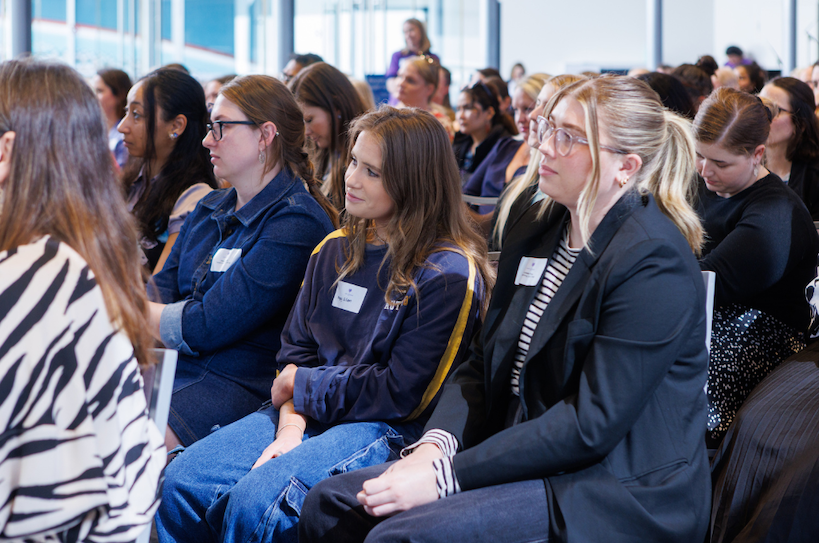
Old wounds
Amy Blair, Program Manager for Young Families at YFS, brought to light how trauma perpetuates the cycle of homelessness, particularly for young mothers. In her work, Blair sees firsthand how the trauma these women experienced as children keeps them trapped in a cycle of instability that’s hard to break free from.
"We hear from young parents every day,” Blair shared. “They know they have trauma, they know the language. They want it to be really different for their kids." But despite their awareness, the harsh reality is that without stable housing, these families can’t focus on long-term goals like mental health recovery or education. “They remain stuck in survival mode, just trying to get through each day.”
Blair recalled a time when it was easier to help young mothers secure housing. “We were able to support young women into houses within a week or so, and that’s when people can shift out of survival mode and start planning for their futures,” she explained. But now, with skyrocketing rental costs and a severe lack of affordable housing, many of those same women are being pushed back into homelessness, stalling any progress they once made.
One of the most heart-wrenching realities Blair highlighted is that pregnant women are often forced to return to temporary housing after giving birth. “We have families in hotels, pregnant women who are probably going to give birth and have to go back to hotels," she shared.
This instability is especially damaging during the critical first 1,000 days of a child’s life, when brain development is at its peak. “Now imagine those first 1,000 days in a hotel, not in a stable home, but in homelessness,” Blair said. “It has a profound impact on the development of a child.”
Financial strain is another massive obstacle. Many of the young mothers Blair works with are doing everything they can, yet still spend over half of their income on rent. “We’ve got young mothers who are doing full-time work, parenting solo, and still more than half of their income is going to rent,” she shared.
This constant financial pressure can lead mothers to buckle under the weight of constant uncertainty. “The next crisis is a mental health crisis,” Blair warned, illustrating how deeply connected financial insecurity and mental health are in the cycle of homelessness.
Inheriting homelessness
Fiona Caniglia, Executive Director of Q Shelter, shared insights into how chronic homelessness is closely intertwined with intergenerational poverty, and the broader failures of our support systems. Reflecting on her 35 years of experience, Caniglia has seen how the complexities of poverty, trauma and substance use have grown, creating unprecedented challenges for people trying to access services.
"The intergenerational impacts of poverty are really very significant," Caniglia noted, explaining that hardship often passes from one generation to the next. Many of the people seeking help today are not just facing financial instability, but are also dealing with issues like substance use and mental health struggles, often tied to their traumatic backgrounds.
Caniglia recounted one story of a young woman who had camped outside of Q Shelter’s office in severe distress, battling a dental crisis and severe addiction. “We sought help through the department, and everybody rushed to our office to help, but as soon as she had pain relief, she left,” Caniglia recounted. "She desperately needed acute care and didn't get it that day."
It’s an incident that reflects a wider issue – that many individuals disengage from services “not because they don’t want help, but because their underlying trauma and addiction are too deep to address through short-term interventions.”
Caniglia pointed out that such cases show the limitations of our current systems, which are largely focused on crisis intervention rather than long-term prevention. "There has to be a moment where we carve our way into an analysis that says this is structural, and we're all a part of that," she said.
To make lasting changes, Caniglia called for a shift in strategy, urging the government to implement a national poverty reduction strategy. "We need to set real targets to reduce poverty where we intensively support families so that children aren't exposed to adverse childhood experiences," she explained.
For Caniglia, the key to meaningful progress lies in place-based solutions – addressing people’s needs right where they live. "We need to invest in prevention and drive solutions that are embedded in local communities," she said, advocating for a more responsive, grassroots approach to tackling the root causes of homelessness.
Solutions rooted in community and care
While the challenges of addressing homelessness are significant, the panel agreed that solutions must be grounded in community and care. Professor Bartlett emphasised the importance of relationships in overcoming trauma, citing research from Harvard’s Center on the Developing Child: "If you felt seen by just one person, it goes a long way to protect your mental health for your whole life,” she said.
Professor Parsell echoed this sentiment, but added that while professional services are crucial, they cannot replace the deep human need for connection. "People who have been homeless for a long time... they’ll say, 'I want someone in my life who's not paid to be there.’ The feeling of isolation, of being marginalised from systems like education and healthcare, is a major consequence of chronic homelessness.”
He said what’s needed is a broader moral framework – one where society values all people’s right to housing.
"We need to frame our mode of helping in a way that's much more transformative," he urged, calling for an approach that provides not just housing, but also social connections and long-term stability.
Ultimately, breaking the cycle of homelessness requires more than just building houses. It demands addressing deeper issues like childhood trauma, intergenerational poverty and the commodification of housing. It’s not just an individual problem, but a societal one – and it’s one that everyone plays a role in perpetuating.
“Homelessness is preventable,” Parsell said, “but only if we are willing to make the necessary changes to how we organise our society.”

